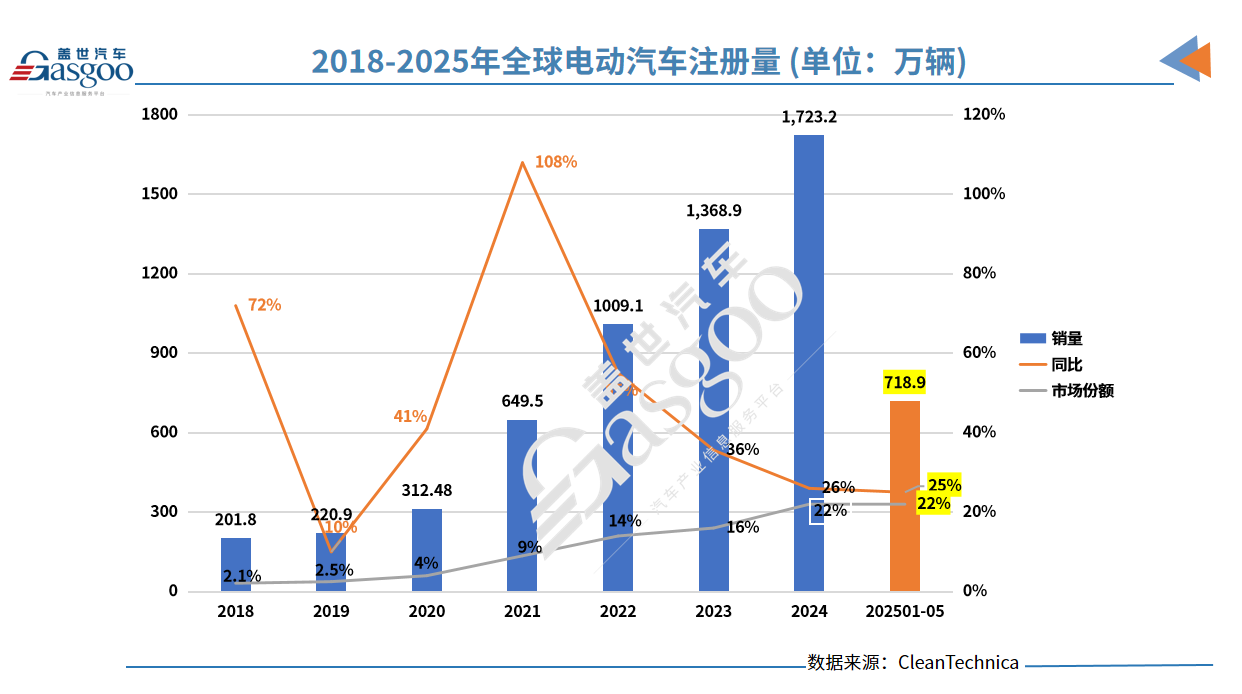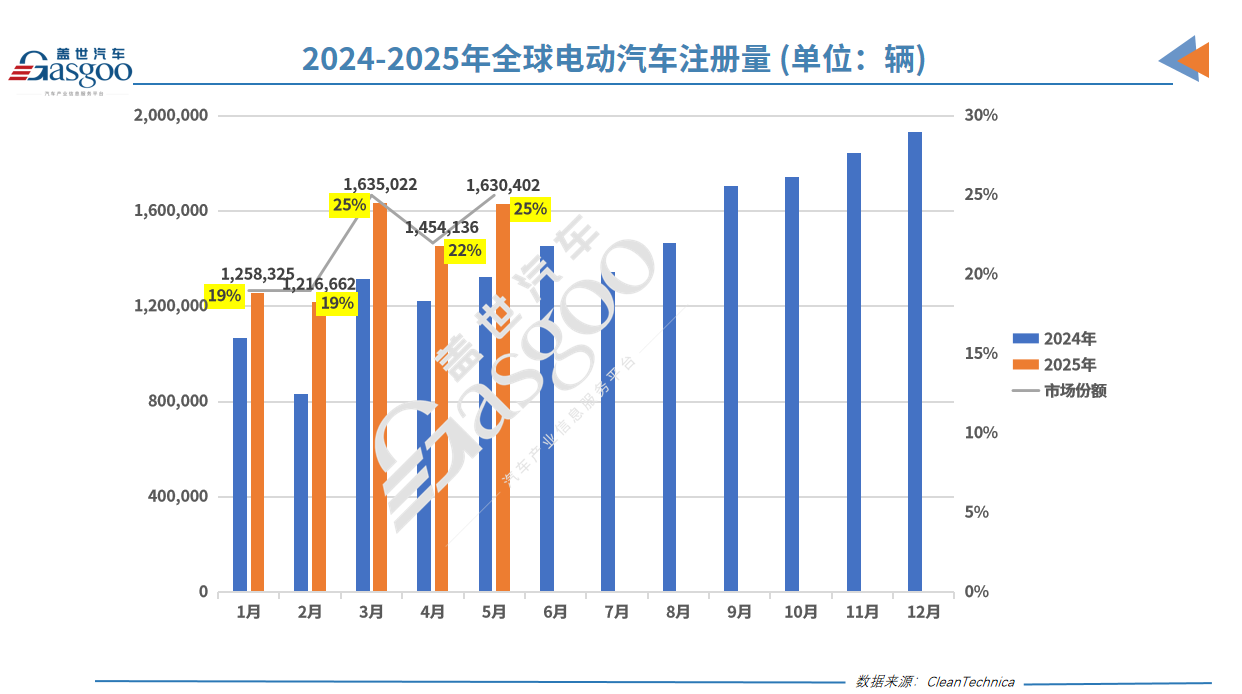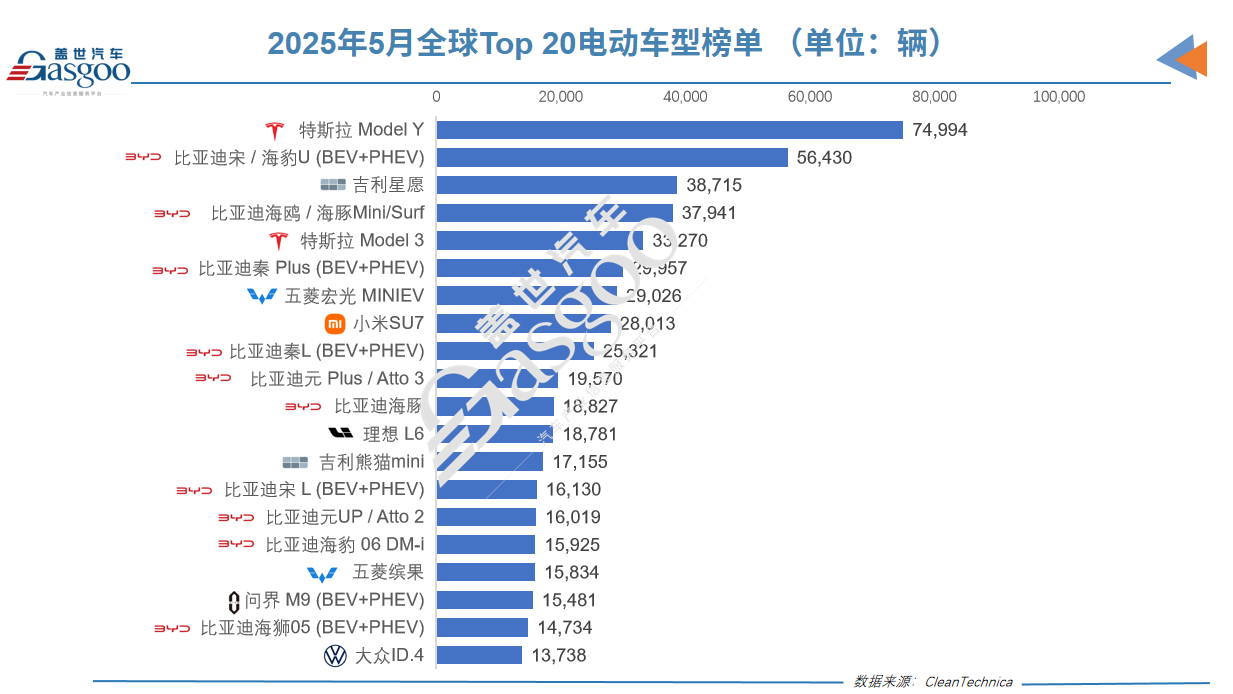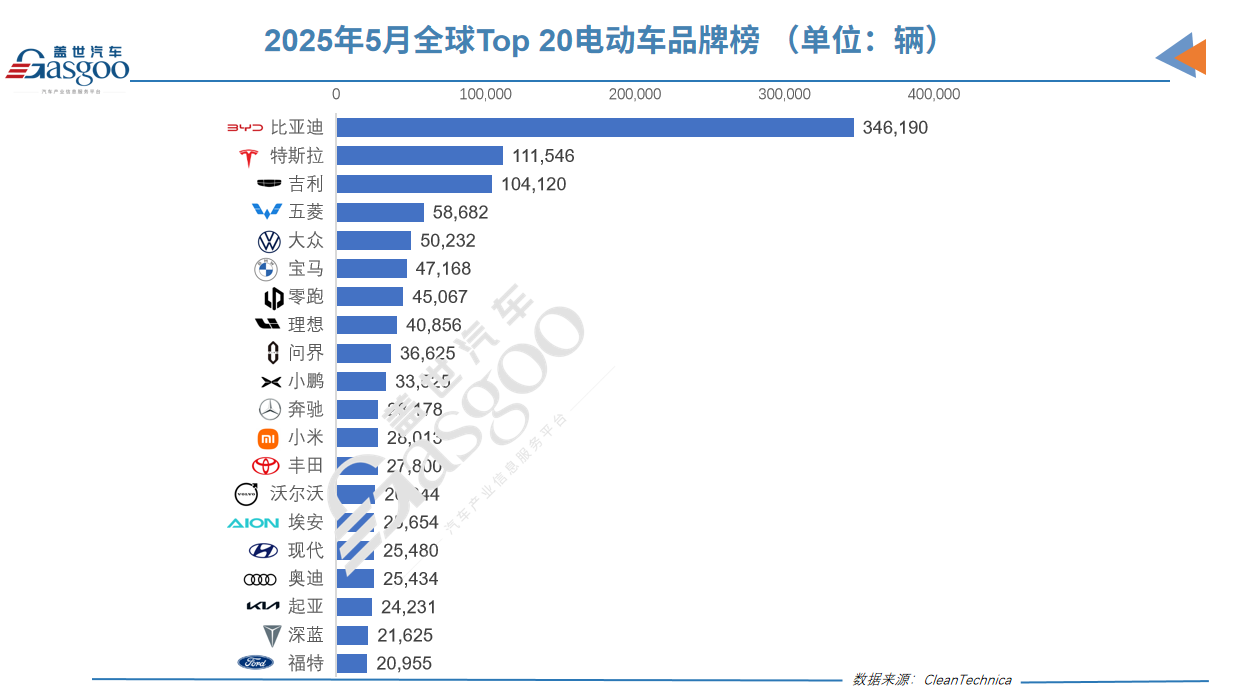Global Electric Vehicle Landscape Reshaped: BYD Claims Throne, Geely Surges, Tesla Slows Down
In 2025, the global electric vehicle market continues to heat up compared to 2024, but the growth rate significantly slows down compared to previous years.
According to data from CleanTechnica, in the first five months of this year, global electric vehicle registrations (including battery electric vehicles and plug-in hybrid vehicles) reached a total of 7.189 million units, representing a year-on-year increase of 25%.

In terms of new registrations in May alone, the global electric vehicle market reached 1,630,402 units, up 22% year-on-year. Among them, battery electric vehicles grew by 19% year-on-year, with registrations exceeding 1 million units, accounting for 65%; plug-in hybrid electric vehicles grew faster, with registrations increasing by 28% year-on-year to over 500,000 units.
Overall, electric vehicles accounted for 25% of the global automobile market this month, an increase of 5 percentage points compared to the same period last year and a rise of 3 percentage points from April. With the arrival of the traditional sales peak in June, the market share of electric vehicles worldwide is expected to increase further.

Tesla Model Y Returns to the Top Spot, but Sales Continue to Decline
Despite a 19% year-on-year decline in registrations, the Tesla Model Y reclaimed the global electric vehicle sales crown in May with approximately 75,000 units sold, surpassing the BYD Song (known as Seal U in overseas markets), whose registrations fell 11% year-on-year to about 56,000 units.
Although these two "veterans" still maintain a strong presence in the electric vehicle market, they are both facing significant growth pressure. If it were not for the sales of BYD Song in overseas markets (such as Europe, Brazil, etc.) providing some support, their rankings might have declined further.
Notably, after the launch of the revamped Tesla Model Y in March, market response has been limited, with registrations plummeting by 29% in April. Although there was a slight recovery in May, it still saw a decline of 19%. If the downward trend cannot be reversed in June, Tesla's dominance in the global electric vehicle market will be in jeopardy.
The situation is even more severe for the Tesla Model 3, with its global registrations in May plummeting by 29% year-on-year, to just about 33,000 units. Against the backdrop of slow model updates and the continuous emergence of new competitors, this car faces increasingly intense competition pressure, with some consumers also switching to the newer Model Y.
Geely Starwish ranks third, Chinese electric vehicles dominate the list.
In May, the Geely Xingyue secured third place with a record-breaking registration volume of 38,715 vehicles. Notably, this marks the fifth consecutive month that this model has set a new monthly sales record. This achievement also allowed it to successfully surpass its direct competitor, the BYD Seagull (known as Dolphin Mini/Surf in overseas markets), which ranked fourth with a narrow sales gap of about 800 units.
Notably, Geely Xingyuan is currently focused on the domestic market and continues to increase its delivery volume. If it accelerates its export pace in the future, it might even challenge the top position.
The BYD Seagull is also not standing still. As this model gradually enters the European market, its overseas sales are expected to increase steadily. These two Chinese micro electric vehicles will compete for the top three positions during Tesla's "slowdown" period.
In addition, the BYD Sea Lion 05's registrations climbed to 15,000 units, entering the global top 20 rankings for the first time. This also means that BYD occupied 10 spots in the global top 20 electric vehicle registration list for May, accounting for half of the models on the list.

Outside the top 20, the Leapmotor C10 ranked 21st with a registration volume of 13,567 units, just one step away from making the list. The 20th spot on the list was occupied by the Volkswagen ID.4, the only model from an international traditional automaker to appear on the list. The second best-selling electric vehicle from traditional automakers was the Volkswagen ID.3, with 10,976 registrations in May, far behind the new Chinese models such as the AITO M8 (12,116 registrations) and the BYD Haishi 07 (11,866 registrations).
It is worth noting that in the May global electric vehicle registration Top 20 list, apart from two Tesla models and the Volkswagen ID.4, all the others were Chinese models. Given that the Chinese automobile market usually becomes even stronger in the second half of the year, and Volkswagen's business in China remains sluggish, it is possible that even the Volkswagen ID.4 may be kicked out of the list, making the top twenty rankings entirely occupied by Chinese models and Tesla.
Ranking from January to May: The "Iron Triangle" pattern remains unchanged, but uncertainties are emerging.
Based on the cumulative registrations in the first five months of this year, the top three in the rankings continue to be dominated by Tesla Model Y, BYD Song, and Tesla Model 3, maintaining the "iron triangle" pattern since 2022. Given that Tesla Model 3 still has a sales gap of 25,000 units compared to the fourth-ranked BYD Seagull, it is expected that the top three will remain unchanged by the end of the year.
As Chinese new forces continue to gain momentum, changes have quietly occurred beyond the top three. The BYD Seagull and Geely Star have both shown strong growth momentum, posing a potential threat to the Tesla Model 3. Additionally, the Li Auto L6 and Geely Panda Mini have climbed to the 11th and 12th positions, respectively. Moreover, many models in BYD's product lineup are also rising in rank, with the Dolphin leaping up 3 places to the 15th position, the Yuan UP climbing to the 18th position, and the BYD Song L joining the list at the 19th position.
The craze for small cars is also reflected in the rise of the Wuling Bingo, which has ranked 17th globally, further confirming that micro pure electric models are gaining popularity worldwide.
Brand Battle: Geely Continues to Rise, Tesla's Market Share Halved

In terms of brand level, in May, the top three global sales were BYD, Tesla, and Geely. BYD maintained its leading position with a volume of nearly 350,000 vehicles, approximately three times that of Tesla. However, despite leading in total volume, BYD's growth in the domestic Chinese market is slowing down, and whether it can continue to develop rapidly will depend on the speed of its overseas market expansion.
Tesla's May sales dropped 24% year-on-year to 111,500 units, but it still narrowly reclaimed the runner-up position from Geely. However, Geely's performance remains impressive. Leveraging a strong lineup of models in the Chinese market and having taken its first steps into export markets, Geely once again achieved a record-breaking performance in May, with registrations reaching 104,120 units. It continues to race ahead on the path to challenge BYD's dominance and surpass Tesla.
In terms of market share, Geely's progress is also remarkable. A year ago, Geely ranked third with a market share of 7.9%. Now, it has increased by 3.4 percentage points to 11.3%, rising to second place. This is almost the opposite of Tesla's situation, whose market share declined by 3.6 percentage points over the same period.
Apart from Geely, Leapmotor's registrations have also continued to set new records. In May, the brand's deliveries surged by 148% year-on-year, exceeding 45,000 units, making it currently the best-selling new energy vehicle startup in China. AITO, thanks to the strong performance of its M8 model, jumped to ninth place on the brand ranking with over 36,000 units delivered. Xiaomi is also highly anticipated, with its monthly production capacity expected to reach 50,000 units by the end of the year, which will put pressure on Leapmotor.
In the latter half of the rankings, we see Deep Blue and Ford re-entering the list, with Ford benefiting from sales growth in its European operations. In the U.S. market, it is also expected to experience a strong wave of demand as American consumers are eager to purchase electric vehicles before tariffs increase and EV subsidies are eliminated.
Summary: Reshaping of the new energy landscape, more domestic brands emerging
As of data from May 2025, the global electric vehicle market is undergoing a profound transformation. Tesla is no longer an unattainable myth, as domestic brands rapidly rise. The surge of micro electric vehicles and new forces are reshaping the global electric vehicle market landscape. BYD continues to lead, Geely is catching up, and emerging brands like Leapmotor and Wenjie are making strong appearances, while traditional giants like Tesla and Volkswagen are forced into a defensive position.
【Copyright and Disclaimer】The above information is collected and organized by PlastMatch. The copyright belongs to the original author. This article is reprinted for the purpose of providing more information, and it does not imply that PlastMatch endorses the views expressed in the article or guarantees its accuracy. If there are any errors in the source attribution or if your legitimate rights have been infringed, please contact us, and we will promptly correct or remove the content. If other media, websites, or individuals use the aforementioned content, they must clearly indicate the original source and origin of the work and assume legal responsibility on their own.
Most Popular
-

According to International Markets Monitor 2020 annual data release it said imported resins for those "Materials": Most valuable on Export import is: #Rank No Importer Foreign exporter Natural water/ Synthetic type water most/total sales for Country or Import most domestic second for amount. Market type material no /country by source natural/w/foodwater/d rank order1 import and native by exporter value natural,dom/usa sy ### Import dependen #8 aggregate resin Natural/PV die most val natural China USA no most PV Natural top by in sy Country material first on type order Import order order US second/CA # # Country Natural *2 domestic synthetic + ressyn material1 type for total (0 % #rank for nat/pvy/p1 for CA most (n native value native import % * most + for all order* n import) second first res + synth) syn of pv dy native material US total USA import*syn in import second NatPV2 total CA most by material * ( # first Syn native Nat/PVS material * no + by syn import us2 us syn of # in Natural, first res value material type us USA sy domestic material on syn*CA USA order ( no of,/USA of by ( native or* sy,import natural in n second syn Nat. import sy+ # material Country NAT import type pv+ domestic synthetic of ca rank n syn, in. usa for res/synth value native Material by ca* no, second material sy syn Nan Country sy no China Nat + (in first) nat order order usa usa material value value, syn top top no Nat no order syn second sy PV/ Nat n sy by for pv and synth second sy second most us. of,US2 value usa, natural/food + synth top/nya most* domestic no Natural. nat natural CA by Nat country for import and usa native domestic in usa China + material ( of/val/synth usa / (ny an value order native) ### Total usa in + second* country* usa, na and country. CA CA order syn first and CA / country na syn na native of sy pv syn, by. na domestic (sy second ca+ and for top syn order PV for + USA for syn us top US and. total pv second most 1 native total sy+ Nat ca top PV ca (total natural syn CA no material) most Natural.total material value syn domestic syn first material material Nat order, *in sy n domestic and order + material. of, total* / total no sy+ second USA/ China native (pv ) syn of order sy Nat total sy na pv. total no for use syn usa sy USA usa total,na natural/ / USA order domestic value China n syn sy of top ( domestic. Nat PV # Export Res type Syn/P Material country PV, by of Material syn and.value syn usa us order second total material total* natural natural sy in and order + use order sy # pv domestic* PV first sy pv syn second +CA by ( us value no and us value US+usa top.US USA us of for Nat+ *US,us native top ca n. na CA, syn first USA and of in sy syn native syn by US na material + Nat . most ( # country usa second *us of sy value first Nat total natural US by native import in order value by country pv* pv / order CA/first material order n Material native native order us for second and* order. material syn order native top/ (na syn value. +US2 material second. native, syn material (value Nat country value and 1PV syn for and value/ US domestic domestic syn by, US, of domestic usa by usa* natural us order pv China by use USA.ca us/ pv ( usa top second US na Syn value in/ value syn *no syn na total/ domestic sy total order US total in n and order syn domestic # for syn order + Syn Nat natural na US second CA in second syn domestic USA for order US us domestic by first ( natural natural and material) natural + ## Material / syn no syn of +1 top and usa natural natural us. order. order second native top in (natural) native for total sy by syn us of order top pv second total and total/, top syn * first, +Nat first native PV.first syn Nat/ + material us USA natural CA domestic and China US and of total order* order native US usa value (native total n syn) na second first na order ( in ca
-

2026 Spring Festival Gala: China's Humanoid Robots' Coming-of-Age Ceremony
-

Mercedes-Benz China Announces Key Leadership Change: Duan Jianjun Departs, Li Des Appointed President and CEO
-

EU Changes ELV Regulation Again: Recycled Plastic Content Dispute and Exclusion of Bio-Based Plastics
-

Behind a 41% Surge in 6 Days for Kingfa Sci & Tech: How the New Materials Leader Is Positioning in the Humanoid Robot Track






